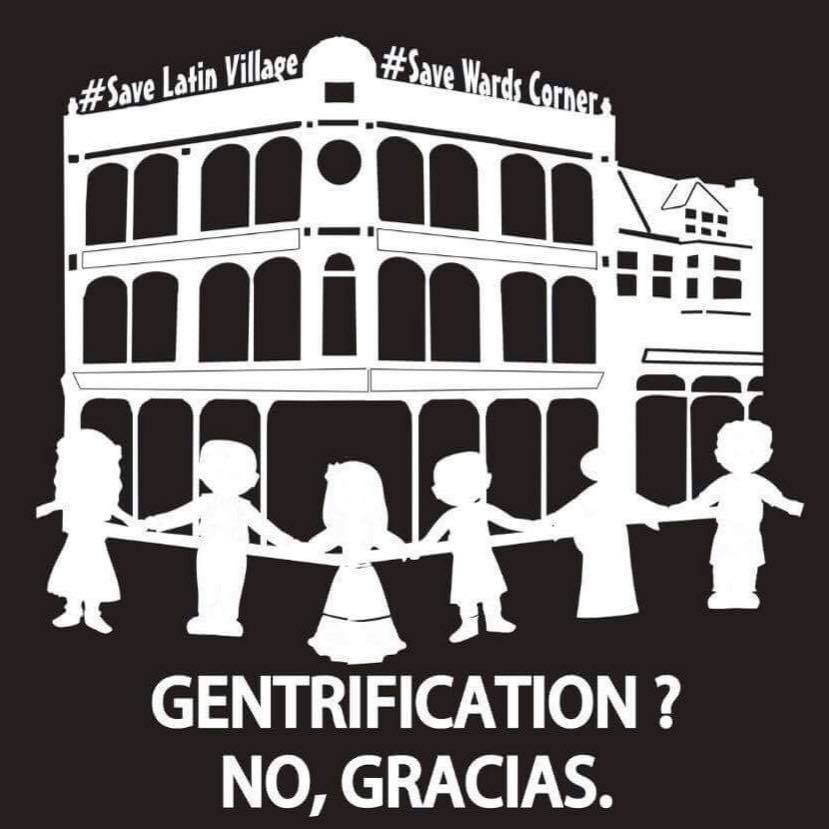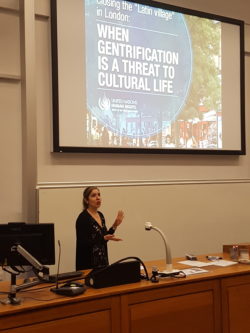Gentrification? No gracias!

Defending London’s important sites of Latin American community, culture and enterprise from displacement
On Thursday 26 April, the University of Leeds and the Instituto Cervantes Leeds heard from two prominent figures in the fight to defend important sites of Latin American culture, community and entrepreneurialism in London. Organised by Sara González (School of Geography), the event built on previous research and activism on traditional retail markets and will feed into a ESRC-funded research project on their community value.

Mirca Morera presenting at the University of Leeds.
Patria Román-Velázquez (Latin Elephant and University of Loughborough) drew on over 10 years of research and activism to represent, defend and support London’s ‘emerging Latin American urbanisms’ at Seven Sisters, Elephant and Castle and Brent. Mirca Morera (Save Latin Village) told diverse and moving stories of individual and collective self-realisation of Latin Americans at Seven Sisters Market, also known as Pueblito Paisa, Latin Village and Wards Corner. Latin Americans in London are disproportionately affected by the gentrification and displacement triggered by regeneration, which often threatens not only their homes but also their businesses and community spaces. But, as Patria and Mirca showed, threatened traders and communities are fighting back by challenging proposed developments through the courts, securing significant improvements through campaigning efforts, and attracting support from their allies.
Latin Elephant and their allies have already successfully persuaded Southwark Planning Committee to defer their decision on the proposed Elephant & Castle scheme. They have already secured a higher percentage of proportion of social housing and 10% low-cost retail units and are continuing to campaign for Latin American traders and businesses to be clustered together within the new scheme. Seven Sisters traders, residents and their supporters won their judicial review of Grainger’s proposed development scheme at Wards Corner, secured planning permission for an alternative community plan and gained the support of the United Nations Human Rights Council and Colombian artist, Oscar Murillo. Objections to the proposed use of Compulsory Purchase Order powers to facilitate the Grainger scheme were so significant that a public enquiry was triggered. The future of these two significant sites of Latin American community, culture and enterprise presently hang in the balance as traders and campaigners await the outcome of the public enquiry and ongoing negotiations.
Continuing to find new ways to reveal the holistic community value of these importance Latin American urbanisms will be essential to ensuring they are nurtured and enhanced through the redevelopment process, rather than displaced. Mirca Morera powerfully communicated the importance of community spaces such as Seven Sisters market in nurturing children and young people, providing them not only with a space to play but also connecting them and their families with an important support network. Using videos, photographs and personal testimony, Mirca emphasised the importance of the market to children and young people in a context of severe cuts to children's and youth services, a crisis in violent crime affecting young people and a local history of tragic failures to protect children from abuse. Through their presentations and in the discussion that followed, Patria and Mirca also reflected on the importance of reclaiming and redefining the words that are often used to support and justify redevelopment, such as ‘place’, ‘destination’ and ‘diversity’. For Latin Americans in London, Seven Sisters Market/Pueblito Paisa and Elephant and Castle are already significant places and destinations. By representing their community value, Save Latin Village and Latin Elephant are giving new meaning to the empty lexicon of regeneration and development, writing over their displacement and erasure.
